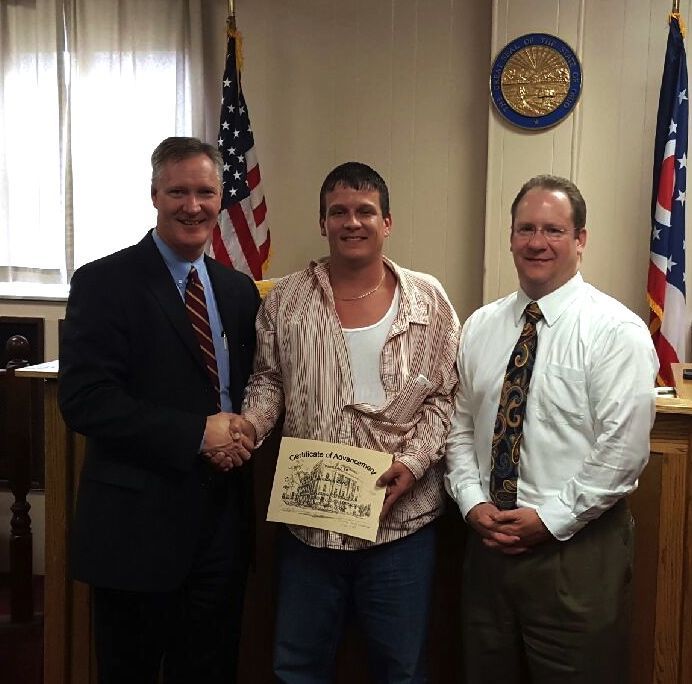
Photo Caption: Congressman Steve Stivers (left) with participant Brandon Berry (center) and Judge Fred Moses (right).
By Kelsey Reno, Staff Writer
From 2000 to 2012, Ohio has seen a 366% increase in unintentional drug overdoses.[1] 1,914 people died as a result of overdoses in Ohio, in 2012.[2] A large reason for these overdoses is prescription drug abuse, and heroin.[3] One court in Ohio is taking a new approach to how the system treats this opiate epidemic that is facing many Ohio communities. Over the Summer I had the opportunity to work closely with that court and their Vivitrol Drug Court Program.
The Hocking County Municipal Court, located in Logan, Ohio, started the Vivitrol Drug Court Program three years ago. The program is a voluntary program for opiate addicts after pleading to certain drug related crimes. Judge Fred Moses of the Court works closely with the community to get the resources necessary to offer participants wrap around treatment. This treatment offers participants the opportunity to leave the addiction lifestyle and become productive members of the community.
Addiction affects many faucets of an addict’s life and the community in which they reside. Many have trouble finding and keeping employment, they face issues in caring for children, often leading to children being taken away. Hospitals and first responders feel the burden of overdoses, and crimes as a result of addiction habits.
Vivitrol is a new approach to treating opiate addiction, such as many pain prescription addictions and heroin. Vivitrol is an antagonist that blocks the opiate receptors in the brain for 28 days.[4] This helps block cravings and therefore helps addicts stay clean. Also, since the receptor is blocked an addict cannot obtain a high even if they do relapse. This helps the brain to heal and become clearer. Once the brain is clear an addict can begin to think properly and work on their addictive behaviors. Vivitrol is different from other medically assisted treatment methods, such as suboxone, because it is a full antagonist. It must be administered by a physician, it does not give patients a high, it cannot be abused, and therefore has no street value.[5] These differences truly make a difference, especially when dealing with addiction in the legal field. Courts can utilize Vivitrol while working to treat addictive behaviors without the worry of abuse, therefore making it a better option.
Within the program participants are required to actively engage in different types of counseling. This includes individual and group mental health counseling, as well as individual and group alcohol and other drug (AOD) counseling. Participants also receive access to medical care, dental care, and case management services. This helps participants break their addictive behaviors and truly change their lives.
While the brain continues to heal, and participants engage in counseling, they grow into responsible and productive members of the community. This starts to also heal the community and is best represented by the 9 participants that graduated from the program on June 18th, 2015. All 9 were employed, and any that had cases with children services had been reunited with their children and were working with children services. They are a shining example of what the program is doing to help not only those addicted to opiates, but also the community as a whole.
This good is done without having to imprison participants for lengthy stays in the regional jail, which can become a costly burden. This burden rarely helps addicts treat their addiction and often creates more problems. Many addicts need help to break their addiction. In Hocking County addicts can look to Judge Moses and the Vivitrol Drug Court Program for the support they need to lead happy, healthy, and sober lives.
For more information about Vivitrol please contact the author or the Hocking County Municipal Court.
[1] Massatti, R., Beeghly, C., Kariisa, M & Potts, L. Increasing Heroin Overdoses in Ohio: Understanding the Issue. (Columbus, OH: Ohio Department of Mental Health and Addiction Services 2014).
[2] Id.
[3] Id.
[4] Treatment with Vivitrol, Vivitrol, http://www.vivitrol.com/HCP/Treatment (last visited Sep 28, 2015).
[5] Id.